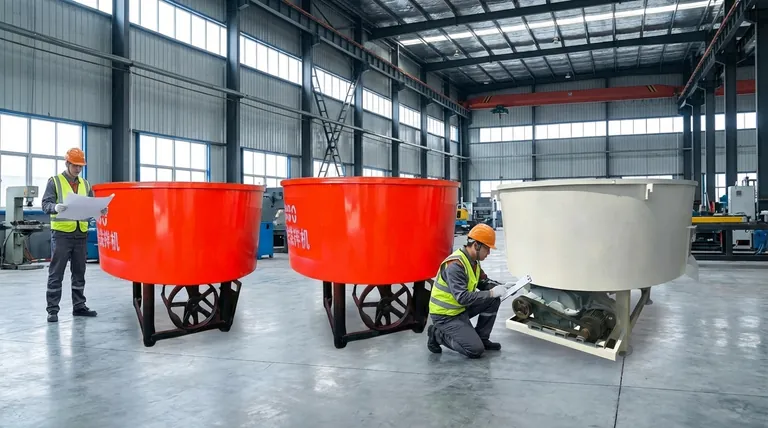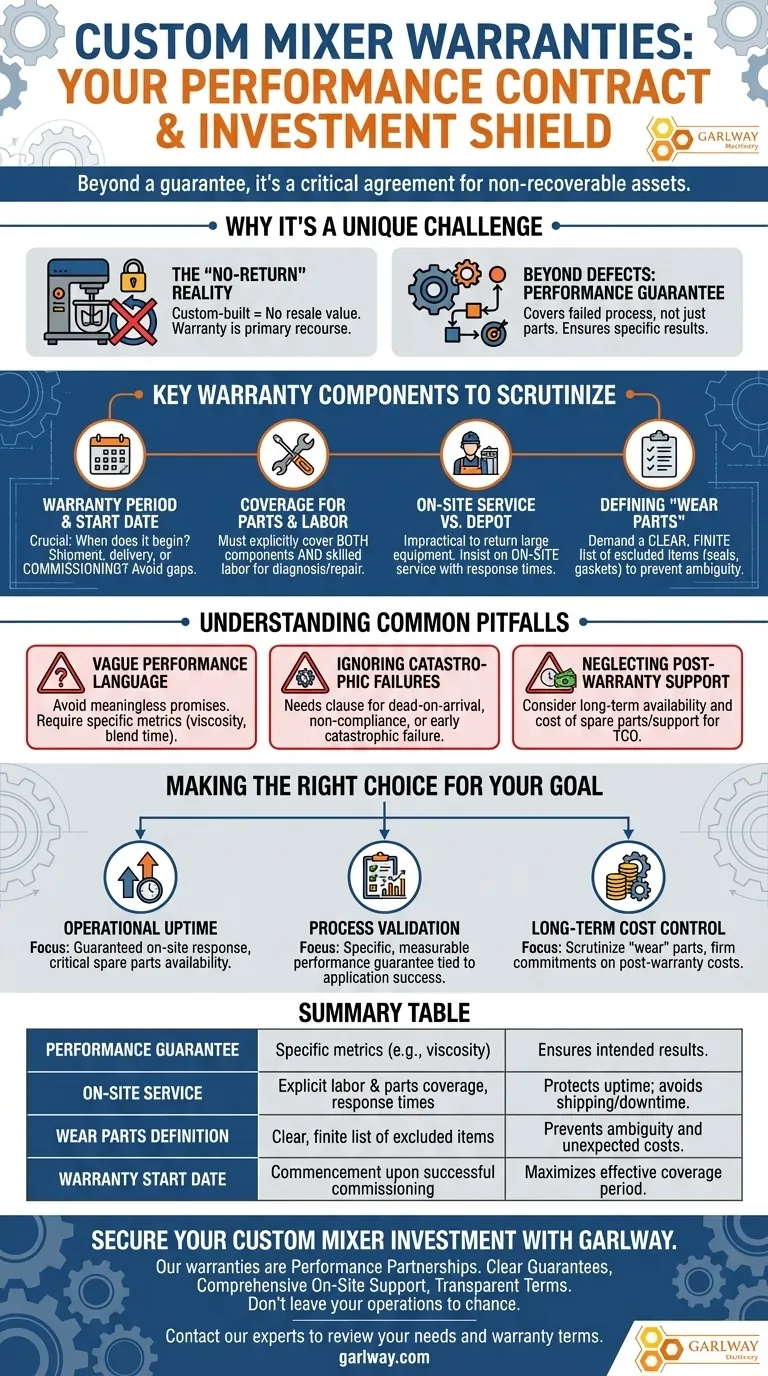Beyond a simple guarantee, the warranty for a custom industrial mixer is a critical performance contract that protects a significant, non-recoverable investment. You must scrutinize the terms covering not just equipment defects, but the mixer's ability to perform its specified process, the availability of on-site service, and the clear definition of covered components.
Because a custom mixer is built specifically for your process, it has little to no resale value for the manufacturer. This makes the warranty your primary and often sole mechanism for recourse, shifting the focus from a simple return policy to a robust performance and service agreement.

Why a Custom Mixer Warranty is a Unique Challenge
Standard warranties for off-the-shelf equipment often revolve around simple repair or replacement. For custom-engineered machinery, the stakes are fundamentally different.
The "No-Return" Reality
Unlike a standard product, a custom mixer cannot be restocked or sold to another customer. Once it is manufactured to your unique specifications, the investment is final.
This financial reality underscores the importance of getting the warranty terms right before you place the order, as post-sale negotiations are nearly impossible.
Beyond Defects: The Performance Guarantee
You are not just buying a motor, gearbox, and impeller; you are buying a specific processing result. A weak warranty covers a failed part, but a strong warranty covers a failed process.
The most critical element is a process guarantee, which ensures the mixer will achieve the specific, measurable results it was designed and sold to accomplish.
Key Warranty Components to Scrutinize
A comprehensive warranty document is detailed and specific. Look for clear language on the following points to avoid ambiguity and future conflict.
Warranty Period & Start Date
The length of the warranty is important, but when it begins is crucial. Does the clock start on the date of shipment, the date of delivery, or the date of successful commissioning? For complex installations, this can represent a gap of several weeks or months.
Coverage for Parts and Labor
A "parts-only" warranty can leave you with significant labor bills. An effective warranty explicitly covers both the replacement components and the skilled labor required for the diagnosis and repair.
On-Site Service vs. Return-to-Depot
For large industrial equipment, a "return-to-depot" clause is impractical and unacceptable. The warranty must clearly state that service and repairs will be performed on-site at your facility. Look for specified response times.
Defining "Wear Parts"
Every warranty will exclude normal wear-and-tear items. The manufacturer should provide a clear and finite list of these parts, such as seals or gaskets. Vague language can allow a manufacturer to classify many failed components as "wear parts," denying coverage.
Understanding the Common Pitfalls
Trust is built on transparency. A reputable manufacturer will provide a clear, unambiguous warranty. Be wary of these common red flags.
Vague Performance Language
Avoid warranties that lack specific metrics. A promise that the mixer "will perform its intended function" is meaningless. A proper guarantee states it will "achieve X viscosity in Y minutes with Z product."
Ignoring Catastrophic Failure Clauses
While the unit is non-returnable for dissatisfaction, there must be a clause addressing situations where the equipment is dead on arrival, fundamentally non-compliant with the agreed-upon design specifications, or fails catastrophically shortly after installation.
Neglecting Post-Warranty Support
Your mixer should operate for years beyond its warranty period. Before purchasing, ask about the long-term availability and cost of spare parts and technical support to understand the total cost of ownership.
Making the Right Choice for Your Goal
Securing the right protection requires aligning the warranty terms with your primary business objective.
- If your primary focus is operational uptime: Prioritize a warranty with guaranteed on-site service response times and clear terms on the availability of critical spare parts.
- If your primary focus is process validation: Ensure the warranty includes a specific, measurable performance guarantee tied directly to your application's success criteria.
- If your primary focus is long-term cost control: Scrutinize the list of excluded "wear" parts and get firm commitments on the availability and cost of post-warranty service and components.
A thoroughly negotiated warranty isn't an add-on; it is the foundation of a successful custom equipment investment.
Summary Table:
| Key Warranty Component | What to Look For | Why It Matters |
|---|---|---|
| Performance Guarantee | Specific, measurable process metrics (e.g., viscosity, blend time). | Ensures the mixer delivers the intended results for your application. |
| On-Site Service | Explicit coverage for labor and parts, with defined response times. | Protects your operational uptime; avoids costly shipping and downtime. |
| Wear Parts Definition | A clear, finite list of excluded items (e.g., seals, gaskets). | Prevents ambiguity and unexpected out-of-pocket costs for repairs. |
| Warranty Start Date | Commencement upon successful commissioning, not shipment. | Maximizes the effective coverage period for your operation. |
Secure Your Custom Mixer Investment with GARLWAY
Investing in a custom mixer is a significant decision. A robust warranty is not just a document; it's your assurance of performance and long-term reliability. At GARLWAY, we understand that your business depends on equipment that delivers as promised, day in and day out.
We specialize in engineering durable and efficient construction machinery, including custom concrete mixers and batching plants for contractors and construction companies worldwide. Our warranties are designed as performance partnerships, offering:
- Clear Process Guarantees: We stand by our mixers' ability to meet your specific application requirements.
- Comprehensive On-Site Support: We cover both parts and skilled labor, with committed response times to minimize your downtime.
- Transparent Terms: No vague language—just clear definitions and commitments to protect your investment.
Don't leave your critical operations to chance. Let's discuss how a GARLWAY custom mixer, backed by a warranty you can trust, can enhance your productivity and profitability.
Contact our experts today to review your needs and our warranty terms
Visual Guide

Related Products
- Commercial Construction Mixer Machine for Soil Cement Mixing Concrete
- Auto Concrete Cement Mixer Machine New
- JDC350 Small Cement Concrete Mortar Mixer
- HZS90 Large Multiquip Concrete Mixers for Construction
- Portable Concrete Mixer Machine Equipment for Mixing Concrete
People Also Ask
- How does a mobile concrete mixer enhance flexibility and convenience on construction sites?
- What is the use of mixture machine? Ensure Consistent, High-Strength Concrete for Your Projects
- What are the maintenance and durability characteristics of self-loading concrete mixers? Built for Rugged Job Sites
- What are the three main phases of the work cycle when using a concrete mixer? Master the Loading, Mixing, and Discharging Cycle
- How do the helical blades inside mixing drums function? Master the Lift-and-Tumble Mixing Action
- What materials can be mixed with a versatile skid steer concrete mixer?
- What are the two major types of concrete mixers? Choose the right one for your project
- What safety features make self-loading mobile concrete mixers advantageous? Enhance On-Site Safety and Efficiency



















